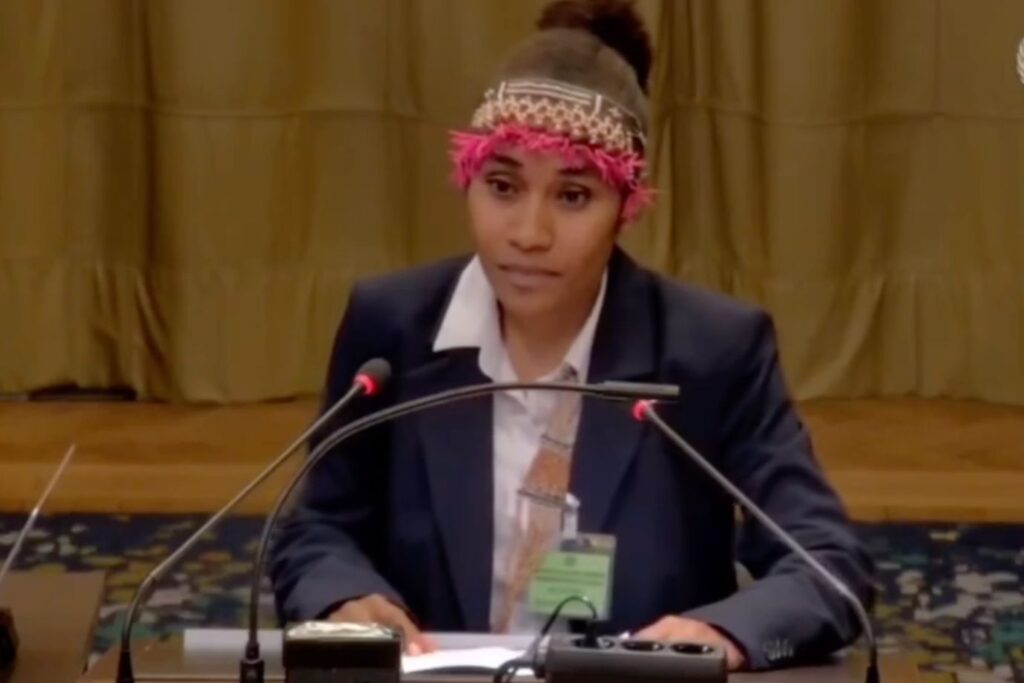Women at the forefront of the climate hearings at the International Court of Justice (ICJ) are imploring the international court to hold large emitters and fossil fuel producers accountable for the extreme damage to the environment.
In March last year, the UN General Assembly unanimously voted to approve a resolution, calling on the ICJ to give an advisory opinion on states’ obligations to address the climate crisis.
On Monday, the hearings began at the Peace Palace in The Hague for the court to develop this advisory opinion. The case is brought by Vanuatu and the Melanesian Spearhead Group, a regional subgroup that represents Fiji, Papua New Guinea and the Solomon Islands.
Hearings will go on for the next two weeks, with the ICJ expecting to receive statements from 98 countries, including the world’s largest emitters of greenhouse gases – the US and China.
This case was brought to the ICJ as a result of years-long campaigning from a group of Pacific Island law students from the NGO, Pacific Islands Students Fighting Climate Change (PISFCC).
Cynthia Houniuhi is the President of PISFCC, a law student and staunch climate activist from the Solomon Islands, and she was heavily involved in the campaign to bring the case to The Hague. Earlier this week, she delivered an address to the court.
“For my people, our land (Mako) is the most precious,” said Houniuhi, a law student from the Solomon Islands.
“Land is our mother – a living, timeless plane where generations past, present and future converge, interconnected and sustained, in an unbroken cycle of life.
“Without our land, our bodies and memories are severed from the fundamental relationship that defines who we are.”
Houniuhi told the ICJ that future generations are at risk, thanks to “a handful of large emitting states” who she says are “responsible for climate change”.
“These states have not only enabled but proactively encouraged the production and consumption of fossil fuels and continue to do so today,” Houniuhi said.
“For my people, and for the world’s youth and future generations, the consequences are existential.”
Margaretha Wewerinke-Singh, the lead counsel for Vanuatu and the Melanesian Spearhead Group, is demanding responsible states to make full reparations “proportionate to historic contributions to the harm” caused by large emissions and ongoing fossil fuel production.
Australian human rights lawyer Jen Robinson is also involved in representing Vanuatu and the Melanesian Spearhead Group at the ICJ, alongside Indigenous law firm Blue Ocean Law.
“I’m proud to represent a state which listened to the demands of grassroots youth movements for climate action in the Pacific and around the world – and which deliberately selected an indigenous led law firm from the Pacific,” Robinson said in a post on Instagram.
“Proud to be part of this team and to work on a case which centres Melanesian and Pacific voices, including inside court.”
Speaking with PISFCC, Fijian MP Lenora Qereqeretabua said the climate crisis is “more than just rising seas and extreme weather”.
“Yes, it is about those things,” Qereqeretabua said, “but it is also importantly about the non-economic losses. It is about losing the very essence of who we are.
“When the land we stand on disappears beneath the ocean, we lose more than just a home. We lose our traditions, our language and our stories. The cultural fabric that binds us to our ancestors.”
Australia has delivered its statement to the ICJ in response to the case. Their argument, along with Germany and Saudi Arabia, contests the idea that states have obligations outside of the 2015 Paris Agreement.
The Paris Agreement, although described by the UN as a “legally binding international treaty on climate change”, does not give states specific targets: rather, states have liberty to set their own targets and policies to reduce emissions.
Hearings will continue into next week.


